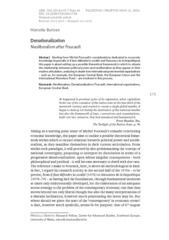Denationalization. Neoliberalism after Foucault
Апстракт
Starting from Michel Foucault’s considerations dedicated to economic knowledge (especially in Il faut défendre la société and Naissance de la biopolitique), this paper is about setting up a possible theoretical framework in which to situate the relationship between political power and neoliberalism as they appear in their modern articulation, analyzing in depth how international governmental organizations – such as, for example, the European Central Bank, the European Union and the International Monetary Fund – are involved in this process.
Кључне речи:
neoliberalism / Foucault, Michel / denationalizationИзвор:
Filozofija i društvo/Philosophy and Society, 2016, 171-185Издавач:
- Beograd : Institut za filozofiju i društvenu teoriju
Институција/група
IFDTTY - JOUR AU - Barison, Marcello PY - 2016 UR - http://rifdt.instifdt.bg.ac.rs/123456789/371 AB - Starting from Michel Foucault’s considerations dedicated to economic knowledge (especially in Il faut défendre la société and Naissance de la biopolitique), this paper is about setting up a possible theoretical framework in which to situate the relationship between political power and neoliberalism as they appear in their modern articulation, analyzing in depth how international governmental organizations – such as, for example, the European Central Bank, the European Union and the International Monetary Fund – are involved in this process. PB - Beograd : Institut za filozofiju i društvenu teoriju T2 - Filozofija i društvo/Philosophy and Society T1 - Denationalization. Neoliberalism after Foucault SP - 171 EP - 185 DO - 10.2298/FID1601171B ER -
@article{
author = "Barison, Marcello",
year = "2016",
abstract = "Starting from Michel Foucault’s considerations dedicated to economic knowledge (especially in Il faut défendre la société and Naissance de la biopolitique), this paper is about setting up a possible theoretical framework in which to situate the relationship between political power and neoliberalism as they appear in their modern articulation, analyzing in depth how international governmental organizations – such as, for example, the European Central Bank, the European Union and the International Monetary Fund – are involved in this process.",
publisher = "Beograd : Institut za filozofiju i društvenu teoriju",
journal = "Filozofija i društvo/Philosophy and Society",
title = "Denationalization. Neoliberalism after Foucault",
pages = "171-185",
doi = "10.2298/FID1601171B"
}
Barison, M.. (2016). Denationalization. Neoliberalism after Foucault. in Filozofija i društvo/Philosophy and Society Beograd : Institut za filozofiju i društvenu teoriju., 171-185. https://doi.org/10.2298/FID1601171B
Barison M. Denationalization. Neoliberalism after Foucault. in Filozofija i društvo/Philosophy and Society. 2016;:171-185. doi:10.2298/FID1601171B .
Barison, Marcello, "Denationalization. Neoliberalism after Foucault" in Filozofija i društvo/Philosophy and Society (2016):171-185, https://doi.org/10.2298/FID1601171B . .


